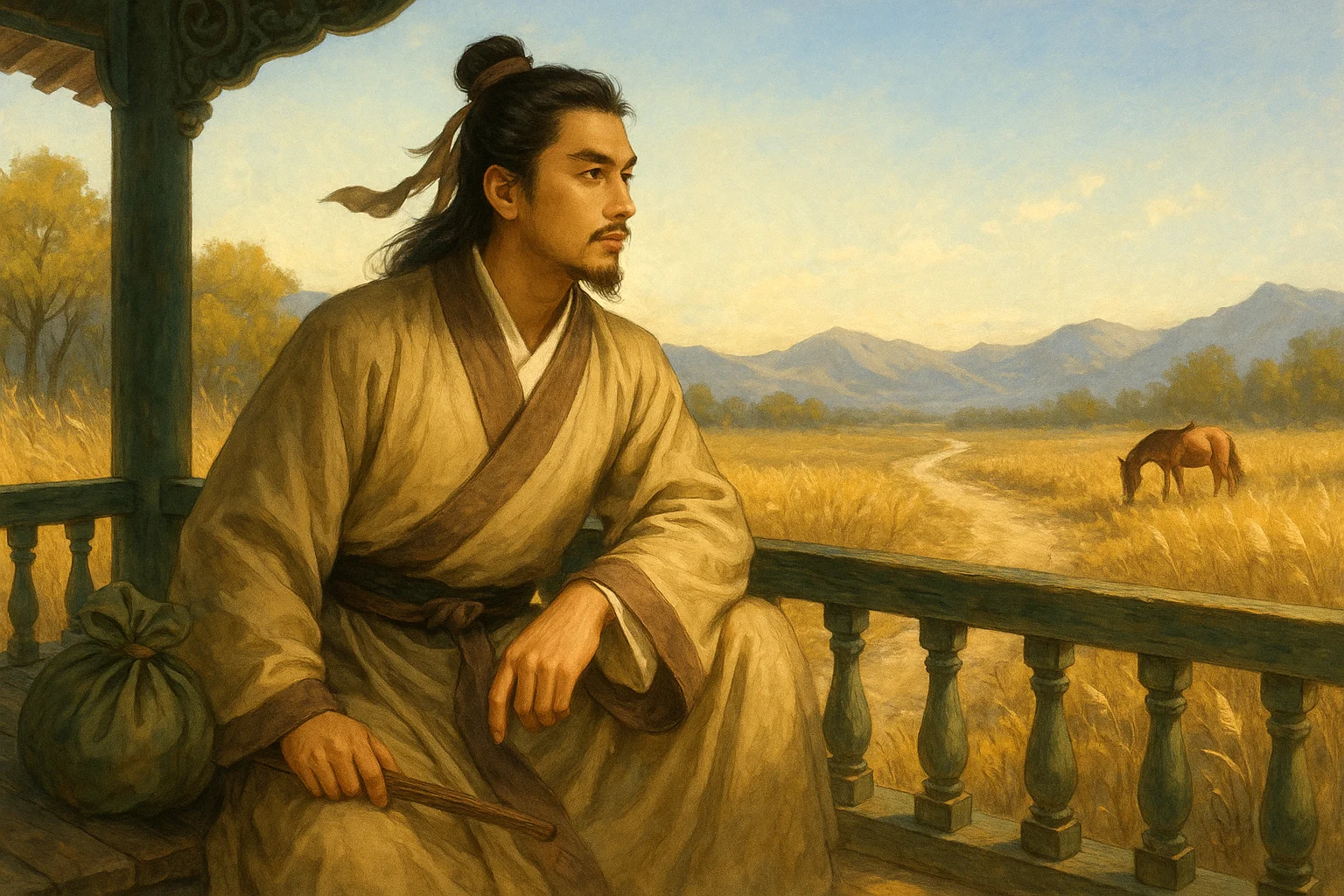Spring blooms blush on morning shore,
Sunset ripples shimmer more.
Through the mist so still and deep,
A lone boat won’t return to sleep.
Original Poem
「黄子陂」
司空曙
岸芳春色晓,水影夕阳微。
寂寂深烟里,渔舟夜不归。
Interpretation
This poem's titular location, Huangzi Embankment, remains geographically elusive, but its watery imagery suggests a Jiangnan riverscape encountered during Sikong Shu's travels. As a leading voice among the Ten Literary Masters of the Dali era, Shu excelled in landscape poetry suffused with traveler's melancholy. Here, he captures a liminal moment—dusk or dawn—at a deserted fishing village, where an unmoving boat becomes an objective correlative for existential stasis. The work exemplifies his signature style: understated scenery vibrating with quiet loneliness.
First Couplet: "岸芳春色晓,水影夕阳微。"
Àn fāng chūnsè xiǎo, shuǐ yǐng xīyáng wēi.
Fragrant banks bask in spring's dawnlight— / Water mirrors sunset's fading glow.
The opening juxtaposes diurnal extremes ("dawnlight"/"sunset") to create temporal ambiguity—perhaps a single observer's prolonged vigil, or nature's cyclical indifference to human perception. The parallel reflections (flowers above, light below) construct a world doubled yet hollow, beautiful yet transient.
Second Couplet: "寂寂深烟里,渔舟夜不归。"
Jìjì shēn yān lǐ, yúzhōu yè bù guī.
Through depth on depth of silent mist, / A fishing boat ignores night's recall.
The couplet plunges into existential stillness: "depth on depth" (深烟里) visualizes solitude's layers, while "ignores night's recall" (夜不归) personifies the boat as willfully rootless. This arrested motion—neither departing nor returning—mirrors the poet's own suspended state between journeying and belonging.
Holistic Appreciation
This poem, though only twenty characters long, unfolds like an ink-wash scroll—vast in atmosphere, serene in artistic conception. Rather than focusing on concrete imagery, it evokes an ethereal, mist-laden mood. The opening line depicts dawn light and spring hues, while the second portrays evening mist and a returning boat, blending the abstract and tangible, movement and stillness, day and night into a Zen-like poetic realm reminiscent of "empty mountains, no human trace, yet water flows and flowers bloom."
Artistically, the "unreturning fishing boat" carries the poem’s emotional core. Is it returning? Or is it withdrawing into seclusion? The poet leaves it unsaid, using "silent" and "night without return" to imply a detachment from worldly affairs and a meditative observation of nature. This reflects the solitary consciousness and attachment to landscapes felt by mid-to-late Tang scholars amid political disillusionment and wandering exile.
Such wordless emotion embodies Sikong Shu’s signature "subtle and distant" style. Though less expansive than Li Bai or Du Fu, it possesses a quiet beauty—like moonlight slanting over water or faint fishing-lamp glow—that lingers endlessly in the mind.
Artistic Merits
- Minimalist Imagery, Blending Abstraction and Reality
With sparse language, the poem conjures a richly layered poetic world. Through contrasts of "dawn" and "dusk," "shore" and "water," it crafts an ethereal, misty beauty where emptiness and substance intertwine. - Scene-Emotion Fusion, Feeling Embodied in Nature
Rather than stating emotions outright, the poet hides solitude within natural imagery. The "fishing boat unreturning at night" becomes a vessel for the wanderer’s displaced heart, achieving perfect unity of scene and sentiment, object and self. - Reserved Expression, Lingering Aftertaste
The poem never mentions the traveler’s return or its timing. Its restrained tone and veiled emotion allow readers to sense quiet ripples of feeling, showcasing masterful artistic economy.
Insights
In a clamorous, restless world, the human heart longs for a tranquil shore—like the poem’s fishing boat, pausing and resting. This is not just physical retreat but a spiritual departure. Faced with disillusionment, exile, and solitude, one may choose nature as a companion, seeking clarity and peace in secluded mountains and silent waters. Sikong Shu’s understated brush paints a still riverbank scene while revealing his heart’s detachment from worldly strife. Brief yet profound, the poem invites quiet reflection—a soft but deep song of wandering, and a hidden path to inner serenity.
About the poet

Sikong Shu (司空曙), c. 720 – c. 790, courtesy name Wenming, was a native of Guangping (present-day Yongnian County, Hebei Province). A renowned mid-Tang dynasty poet, he was one of the "Ten Literary Masters of the Dali Era," alongside Lu Lun, Qian Qi, Han Hong, Li Duan, and others. Though his life lacked illustrious achievements, his poetry—marked by genuine emotion in simplicity and profound contemplation in solitude—secured him a unique place in mid-Tang literary circles.












